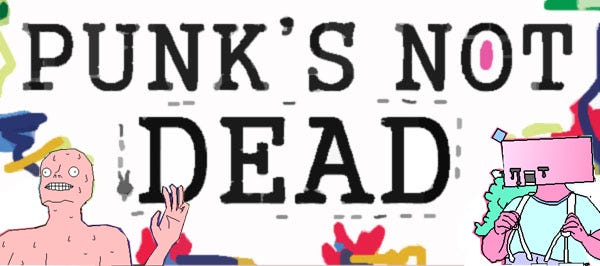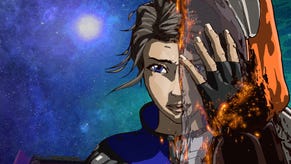Punk’s Not Dead: Cactus
With Prickles
Punk's Not Dead is the regular column that looks at the snot-nosed, blue-haired, noisy frontier of game development. You know the one: that experimental, rude one, with the games about colours and nightmares. Speaking of which...
This time: Cactus.
I once met a game developer in the street who promised to show me his tattoo. “You’ll like it,” he said, violently hocking some phlegm at a toothbrush advertisement on the side of a bus shelter. “It’s punk and all.” All right show me, says I. He closed his eyes for a long time, as if calmly concentrating on something. “Well?” he said. I announced that I was experiencing both bewilderment and impatience. “Look again,” he said. He leant in close. On each eyelid there was tattooed a miniscule mural depicting the graphic crucifixion of an adorable animal. On the left eye, a Labrador pup. On the right: a kitten, Scottish Fold and not three weeks of age. It was a shocking and very artistic encounter at a bus shelter. True story.
Actually, it’s not. I made that all up because I had absolutely no idea how I was going to start this fortnight’s post. In social scenarios they call this “lying”. In artistic scenarios, such as making games, it is known as “improvisation.” Among punk gamemakers (and to a large extent every indie), the practice of improvising is not treated with suspicion or mistrust – it’s encouraged. Nowhere is this more evident than during game jams.

For the suits among you (I’m looking at you, Milford) a game jam is when a group of people get together, either over the internet or in the ever-decaying “real” world, and make games in a very, very short time. Sometimes – but not always – a theme is suggested. Themes like “loneliness” or “death” are common. But luckily, so is “cats”. The idea is that with both a tight deadline and a modicum of an idea, you’ll have to blast through development, stripping out all the superfluous processes such as concept art or, you know, testing to see if things actually work. Many rules and methods are thrown out. There is no time for such tedium during The Jam.
In games, just like in punk music, The Jam is very important. The time limits imposed during a game jam mean whatever comes out is likely to feel punky, no matter the intention of the creator. Games made during these events are often a grotesque, ramshackle bundle of code and pixels, hacked together under pressure and (probably) intense delirium. If the offspring of a game jam were a person it would be a frightening asexual mannequin built from cardboard toilet paper tubes, hanging limply together through liberal use of Wrigley’s Extra and desperately masquerading as a functioning member of society by wearing a novelty tie. I imagine it would walk a lot like Octodad.

Ugly, perhaps. Broken, sometimes. But often intriguing to behold and usually saved by one crucial consideration: they never last longer than a few minutes. This is a defining element of punk. Rare is the child of bitpunk that lasts longer than an hour. Brevity is your friend – partly because it lets the game deliver a single concentrated punch but also for another perhaps less-admitted reason, which is that these games are often mechanically derivative by nature. What I mean by that is that they’ll often have to conform to type – be it side-scrolling platformer or point ‘n’ click – but that they aim to make up for this in improvised strangeness. Weird music, hallucinogenic artwork or daft storylines are the cover needed for any mechanical limitations and this cover can only last so long. The solution: make your game quickly, to be played quickly.
Many indie developers, whether they’d consider themselves “punk” or not, would recognise and embrace this philosophy. A dev called Cactus stands among them. Search for the name and you may find that Cactus is a maker of “high-quality Christian games and toys for all ages”. But trust not this algorithmic Googlemancy. Cactus is actually a fella by the name of Jonatan Söderström, who makes many short-form games. Games that even non-Christians can enjoy. Like others he’ll gladly fuck with genre – from racing naked, sweating madmen in Hot Throttle to blasting vector graphics to pieces in shmups like Seizuredome the familiarity of the game type won’t stop you from admiring the sheer insanity accosting your ocular nerve. But he’s also not afraid to do something completely outta sync, such as Scandinavian toubled-soul-simulator Norrland, much admired by Quinns.

Naturally, I asked Cactus for a chinwag. But when I spoke to him I soon discovered that after making so many short-form games, he is actually now working on a longer one. Does this put his punkness in jeopardy? Will he still be one of us when he’s through? Or will he have to get terrifying eyelid-tattoos to reclaim his punk mantle? Now, read on.
RPS: Hello Cactus! Your most recent creation was a collaboration between you and a band called Fucking Werewolf Asso. It was about a purple werewolf. There were many sounds. But this was the first release in aaages. Where have you been!?
Cactus: I've been busy working on various projects, some of which have failed. Since I won the Nuovo Award at IGF I've felt a lot of pressure building up, and haven't really come up with any smaller ideas that feel worthwhile pursuing. Money (or the lack there of) has occupied my mind and I've also tried to broaden my creative field to things other than games, although I'm not in any way considering giving up making games. Right now I have three game projects that have grown out of hand, two of which I think I'll release this year; Tuning and a new game that I've been working on with the singer from Fucking Werewolf. It's kind of sad to look back and see how few games I've actually finished lately but I feel like that will change as soon as I get this "make a big game" thing out of my system. I've also made two or three games for various competitions and events that I never really put the finishing touches on, but are basically complete games. A metroidvania from No More Sweden the year before last, a two player versus game from the TIGSource competition and the next Mondo game for the Killscreen part at GDC last year. So I'm predicting a small burst of game releases around the start of summer!

RPS: A lot of your games are explosions of colour and music, with lots of shaking animations and so on. Like Seizuredome. What is it about that “scratchy” aesthetic that appeals to you?
Cactus: I think it's a nice style because it looks interesting and is able to convey as much as polished graphics (sometimes it can even convey more) and it's easy to produce. If you can make something look good and unique without having to exert yourself in the process, that's a pretty fantastic thing in my opinion. I also generally appreciate minimalism and different approaches to presentation within music and film, so I guess it comes naturally.
RPS: Then other games are darker with a more moody atmosphere, like Norrland, which gets very dark indeed. What determines whether you make a loud, upbeat game or a more tense one?
Cactus: I don't think I've ever set out to do an upbeat game, I always try to include something bizarre and - at least slightly - disturbing. In Seizuredome you kill naked sweaty people, for instance. However sometimes it's interesting to present something which on paper should be strange or dark in a bright and cheerful way to create a form of contrast which I think makes an impression on people - perhaps subconsciously - and this is probably one of the reasons my games have gained popularity.

RPS: Do you think there’s a place in the world for small, short-form games like those you make? Or are they going to die out?
Cactus: They'll make a comeback but right now I think that even if they're still being made they're sort of slipping out of the spotlight. Indie games have become a big thing the last few years, I don't think there's any blogs left that focus on freeware games, it's mostly casual or commercial indie titles that are being highlighted. A few years ago innovation was the term on everyone's lips, these days it's money and business.
RPS: You are a fan of making games in a very short time, and you proudly list the development time next to each entry in your library of games. What is it about rough and ready development that interests you?
Cactus: I'm not a fan of making games in a short time per se. I kind of regret writing down the development time on my site since I can see why it is easily misunderstood. I started doing it as an excuse for not pursuing the full potential of the games I were making, basically telling people that they would be experiencing something that is rough around the edges. I also did want people to know that you could make decent games without having to invest years, months or even weeks of your time. But now that I look at it, it does come off as me trying to brag or make a big thing out of it. However that doesn't mean that I dislike short development cycles. I think it's a great thing for trying out ideas. I would encourage people not to work on a game for too long unless they're sure that the game is worth it. I've heard a lot of people saying that a game is always better if you take your time to polish it. I've made that mistake several times myself and at some point I just come to the realization that the game I'm working on just isn't worth the effort needed to get it to where I want it, and that there's no guarantee that the game will be great/good even if I manage to complete it. And then I end up feeling bad because I've wasted a lot of time and creative energy to get to this point. Prototyping or having a short development cycle prevents this.

RPS: Game jams have been cropping up all over the place in the last few years. It seems like a good way to make short games among other people. Are you a fan of these kinds of events?
Cactus: Yes I am. I feel bad about not having participated in one for a while actually. I generally think that game jams that take place over the internet produce way better results than those where you physically appear on-site to make games together. Those game jams are usually a lot more fun though, but when people start working together face to face they always seem to end up coming up with terrible ideas. Most seem to make games based on humorous concepts that either aren't funny or are terrible executed, and the few serious games you see often feel half-hearted. I think it's inherent to hold back or exaggerate when planning out game concepts in a group unless you're already familiar with the people you're working with. You're both afraid to be criticised for your own ideas (especially if they are serious) and at the same time you're afraid to hurt other people's feelings if you criticise theirs, so you end up with a lot of second rate material. Not the best recipe for good results. That's why I mostly end up drinking and having fun when visiting real-life game jams. Then again, it seems to work pretty well for people who find the right partners or have a strong desire to make something they can feel proud of. In general, game developers seem to be more daring when they sit alone behind a computer screen, though.
RPS: Do you think there is a punk movement among the gaming community? As in, people with little or no coding experience making games for themselves? Would you call what you do “punky”?
Cactus: There's definitely been a punk movement and there still is, though it's not as prominent anymore, I think. And yes I would probably say that I'm still part of it, though I'm not sticking to it as much as I used to. I wish there were more developers like thecatamites who at the same time as he doesn't seem to give a shit about anything still produces games that give a far more intelligent impression than 99% of the games that get attention these days. Right now, even the people who used to represent the "punk" in indie games seem to be thinking about people's expectations and money. I guess that comes naturally when you gain some recognition coupled with growing older, but it still feels a bit sad nonetheless.

RPS: Finally, are you going to continue making short games? Or work on something more long-form?
Cactus: I want to continue, think I will continue, and generally see no reason not to continue making short games. However, regardless how I feel about it I need to release something I can be proud of and possibly make a living from first. Who knows how I'll feel after that... Maybe I'll get a thirst for money if I'm successful, maybe I'll get depressed if my game is a complete fiasco, maybe I'll feel even more pressure to make something worthwhile if my game is somewhere in between..?









